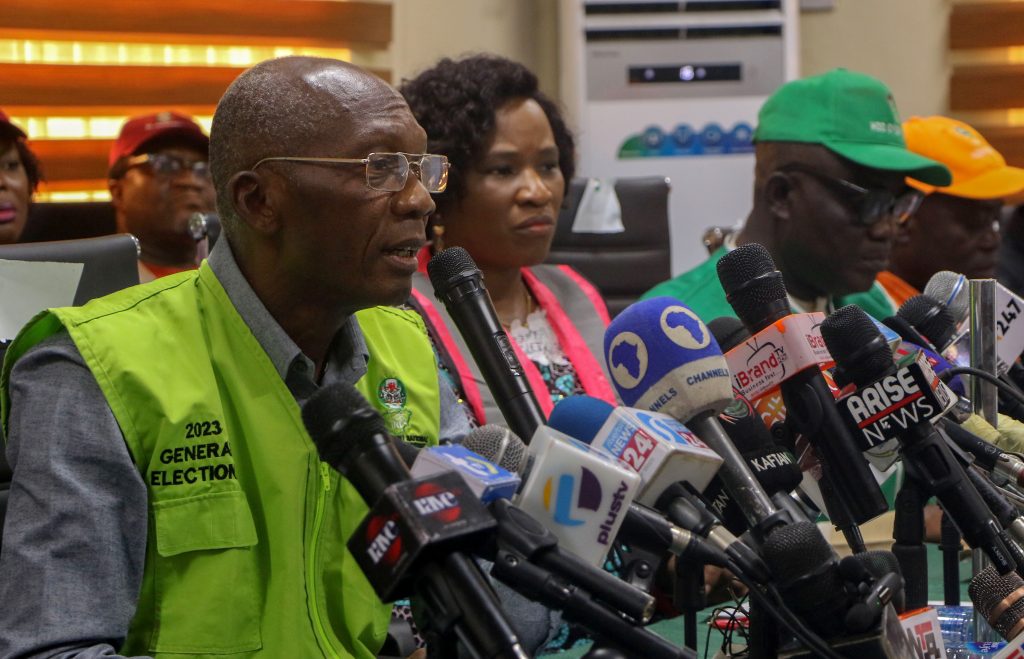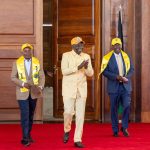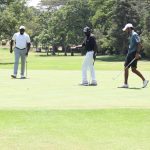
A disinformation campaign is targeting Nigeria’s election regulators and supreme court judges, who will have to rule on claims of vote rigging following a presidential ballot marred by delays and fraud accusations.
Elections in Africa’s biggest democracy are often impacted by vote-buying, disenfranchisement and violence. But disinformation has also become an issue, influencing the political discourse both before and after the ballot.
AFP Fact Check has debunked dozens of election-related claims, including allegations that a photo showed president-elect Bola Tinubu bribing a senior judge at his home.
But the picture, which surfaced after the February 25 vote, was old and showed Tinubu with an opposition politician in London.
“The impact of the disinformation campaign… is pervasive and will have implications beyond this election cycle,” said Afolabi Adekaiyaoja, a research analyst at the Centre for Democracy and Development.
“In the short term, it will be used to discredit the processes and the relative outcome,” he warned.
Several polls had projected that opposition candidate Peter Obi of the Labour Party, would come out ahead of Tinubu, the candidate of the governing All Progressives Congress (APC), and Atiku Abubakar of the People’s Democratic Party (PDP).
Obi’s campaign resonated with Nigeria’s large youth population, though his opponents dismissed the elections as flawed.
After days of delay in tallying the result, the Independent National Electoral Commission (INEC) declared Tinubu, a veteran political operator, the winner — a decision that left many young Nigerians disappointed.
“The presidential election was just a big mess,” the popular rapper Falz told Arise Television.
INEC acknowledged technical difficulties in the vote counting but denied any large-scale vote rigging.
– Lost trust –
The PDP and the Labour Party have filed legal challenges to the result that could lead to a long legal dispute likely to culminate at the Supreme Court.
“The election… was invalid by reason of corrupt practices and non-compliance with the provisions of the electoral act,” according to a formal petition Obi submitted to the court.
Both Obi and Atiku have asked the tribunal to declare them the election winner.
Their supporters believe that Tinubu and the governing party have already struck a backdoor deal with the courts to confirm his election.
This context has provided fertile ground for disinformation, such as the photo allegedly showing Tinubu bribing the Supreme Court’s chief justice, Olukayode Ariwoola.
In reality, the image dates back to 1996 and shows Tinubu with opposition politician Dele Momodu, who also refuted the bribery allegation on social media.
Still, social media is replete with unsubstantiated claims of Tinubu attempting to bribe Supreme Court judges as well as the International Criminal Court — even though the latter has no role in Nigerian elections.
“[Disinformation] is really a major problem in Nigeria,” said Kemi Busari, an editor at the Nigerian fact-checking organisation Dubawa.
“People don’t care about your fact-check. All they care about is their biases.”
– Tech ‘glitches’ –
The delay in uploading results to a central portal after the ballot also fuelled disinformation.
Ahead of the vote, INEC chairman Mahmood Yakubu told political parties that officials would transmit photos of result sheets from the polling units to the viewing portal.
But only a handful were uploaded a day after the election, while others trickled in days after. Critics accused the INEC of not honouring its own guidelines.
The regulator blamed the downtime on “glitches” and ruled out “intrusion” or “sabotage”.
“The smouldering disillusionment felt by many Nigerians is not so much because their candidate did not win as because the election they had dared to trust was, in the end, so unacceptably and unforgivably flawed,” said Chimamanda Adichie, the best-selling Nigerian novelist, in an op-ed published in The Atlantic.
The disappointment further fuelled disinformation regarding the INEC, including false claims about a Nigerian minister and Tinubu ally accessing the computer server housing the election results before the winner was officially declared.
AFP also debunked another video, which had garnered thousands of views, purporting to show INEC’s Yakubu dining at Tinubu’s home the day after polls closed.
INEC spokesman Rotimi Oyekanmi said the commission had been the subject of a “series of desperate smear campaign efforts by mischief makers”.
– ‘Proactive communication’ –
Missteps by the Nigerian government have also been seized upon by opponents hoping to spur disinformation campaigns.
Nigeria’s secret police raided the homes of two Supreme Court judges in October 2016, though both were later cleared of any wrongdoing.
And in 2019, the country’s most senior judge at the time, Walter Onnoghen, was charged with non-declaration of assets, a move government critics said was politically motivated.
Adekaiyaoja said “proactive communication” by the INEC and the judiciary could help counter the false narratives.
“Access to information plays a role in reducing the concerns that many citizens have around these processes,” he said.
tb/pma/nla/js
© Agence France-Presse






